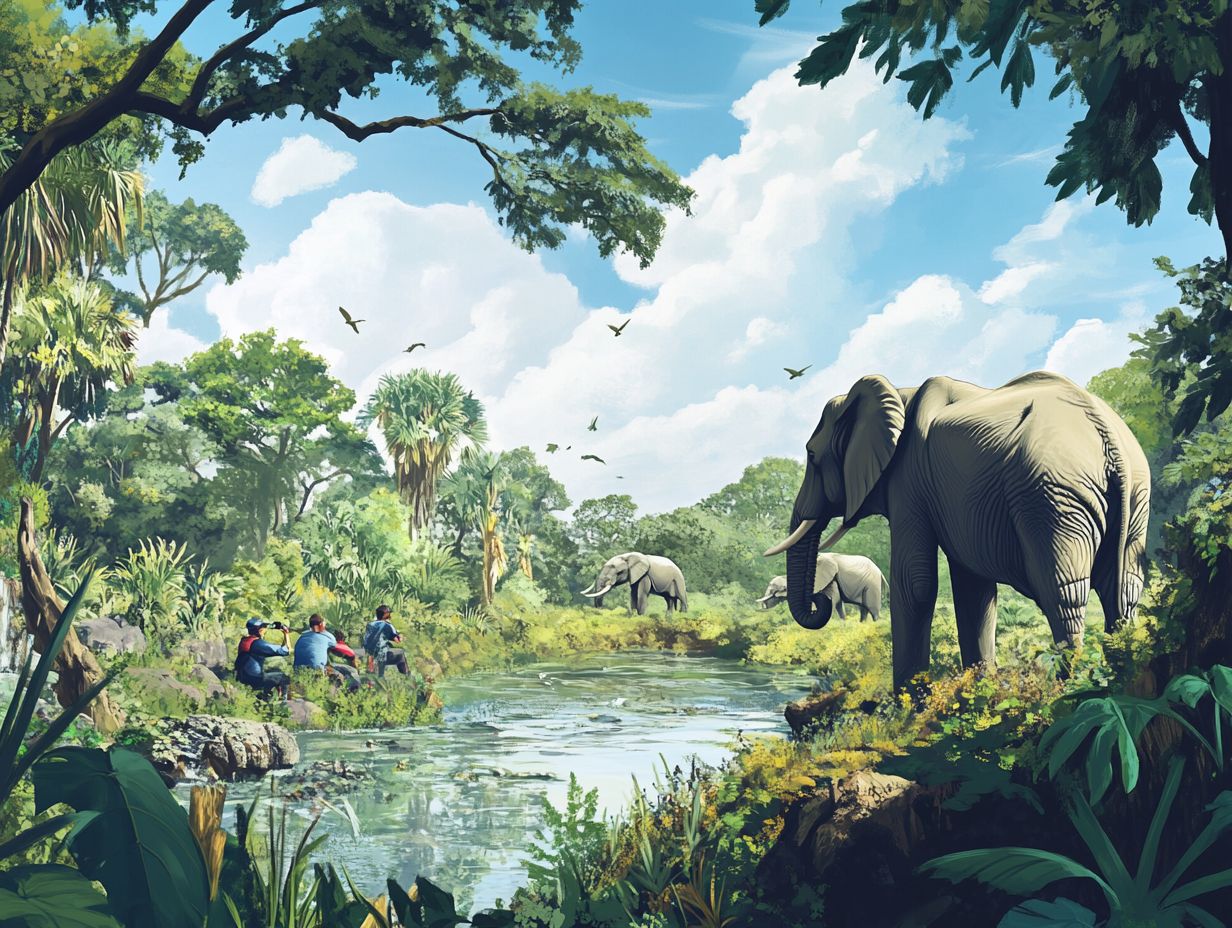Tips for Sustainable Wildlife Tourism
Wildlife tourism is your ticket to experiencing nature’s wonders up close! It offers a chance to connect with nature and immerse yourself in the stunning beauty of our planet’s ecosystems. However, it also carries significant responsibilities. Your choices can profoundly impact wildlife and their habitats.
This article explores the importance of sustainable wildlife tourism. You will find guidelines for responsible practices, tips on selecting ethical tour operators, and strategies to minimize negative effects during wildlife encounters.
You ll discover how to actively support conservation efforts. Understand the crucial role that both tourists and industry leaders play in preserving our natural world. Embrace this chance to make a positive difference while enjoying the marvels of wildlife!
Contents
- Key Takeaways:
- The Importance of Sustainable Wildlife Tourism
- Principles of Sustainable Wildlife Tourism
- Choosing Responsible Wildlife Tourism Activities
- Minimizing Negative Impact on Wildlife
- Supporting Conservation Efforts
- Frequently Asked Questions
- What is sustainable wildlife tourism?
- Why is sustainable wildlife tourism important?
- What are some tips for sustainable wildlife tourism?
- How can I support sustainable wildlife tourism?
- What are the benefits of sustainable wildlife tourism?
- What are some examples of sustainable wildlife tourism activities?
Key Takeaways:

- Choose responsible tour operators and activities that prioritize the well-being of wildlife.
- Minimize your impact on wildlife by following best practices.
- Support conservation efforts by contributing to organizations and being a responsible tourist.
The Importance of Sustainable Wildlife Tourism
Sustainable wildlife tourism is vital for protecting the planet’s rich variety of plants and animals. It also provides unique travel experiences that uplift local communities and encourage environmental awareness.
By embracing responsible tourism practices, you can ensure your adventures leave a positive mark. This supports conservation initiatives, animal welfare, and the cultural heritage of Indigenous communities.
This approach not only aids in wildlife protection but also enhances your understanding of ecological balance, benefiting both travelers and industry leaders.
Understanding the Impact of Tourism on Wildlife
Wildlife tourism can significantly affect ecosystems. It s essential to recognize both its positive and negative effects, which impact not just animal populations but the entire environment.
On one hand, it raises awareness and generates funds for conservation. On the other, it can lead to biodiversity loss and disruptive human-animal interactions. For instance, adventure tourism may disturb natural habitats. Poorly managed elephant sanctuaries may treat these magnificent creatures as mere attractions, rather than respecting their natural behaviors.
The degradation of coral reefs, a common highlight of marine tourism, serves as a reminder of the vulnerability of these ecosystems to human activity. Finding a balance between enjoyment and preservation is a critical challenge in wildlife tourism.
Principles of Sustainable Wildlife Tourism
The principles of sustainable wildlife tourism focus on minimizing harm to wildlife while enhancing environmental benefits. It also aims to foster a sense of environmental awareness among travelers.
By following these principles, you can help preserve ecosystems while enjoying meaningful travel experiences.
Key Guidelines for Responsible Tourism

Follow these simple rules for responsible tourism to ensure your travels contribute positively to wildlife protection and the environment.
Enhance your impact by selecting eco-friendly accommodations that prioritize sustainable practices. Avoid places that engage in greenwashing. Choose locations that minimize their carbon footprint and promote animal welfare.
Respect wildlife habitats. Ensure that your explorations do not disrupt natural environments. Supporting ethical practices among tour operators is equally crucial. Select companies committed to responsible wildlife tourism, protecting the ecosystems that captivate us.
Join us in making a positive impact on wildlife and their habitats today!
Choosing Responsible Wildlife Tourism Activities
Choosing responsible wildlife tourism is essential for ensuring that your travel experiences align with ethical considerations and contribute meaningfully to conservation efforts.
Evaluating Tour Operators and Activities
When evaluating tour operators and activities, it s crucial to consider their commitment to sustainable travel. Understand how their practices affect local economies and ecosystems.
A detailed examination of certifications serves as a great starting point. Reputable operators often have endorsements from respected organizations, signaling their dedication to ethical practices.
Delving into their conservation strategies reveals how they prioritize environmental impact and wildlife protection, ensuring that tourism doesn t compromise natural habitats.
Engaging with local communities is a key indicator of responsible tourism. Operators who collaborate with residents support cultural preservation and enrich the overall travel experience.
By focusing on these key elements, you can select operators that genuinely value sustainable tourism and positively contribute to both people and the planet.
Minimizing Negative Impact on Wildlife
Minimizing negative impacts on wildlife demands your commitment to best practices that encourage responsible interactions with animals. Doing so fosters habitat safety and upholds the ecological integrity that sustains these remarkable creatures.
Best Practices for Wildlife Encounters

Implementing best practices for wildlife encounters greatly minimizes the environmental impact of tourism while enriching educational experiences through eco-travel initiatives.
By prioritizing eco-tourism, you connect with nature in a more meaningful way. It s crucial to understand and respect animal behavior this means keeping a safe distance, avoiding the temptation to feed wildlife, and minimizing noise to ensure the animals feel secure.
Choosing low-impact activities, like guided walks through wildlife sanctuaries or wildlife photography tours, allows for intimate encounters without disruptive behaviors.
Supporting local conservation initiatives helps preserve vital habitats and enables communities to thrive through sustainable adventure tourism. This fosters a deep mutual respect between you and the natural world.
Supporting Conservation Efforts
Supporting conservation efforts is a cornerstone of responsible tourism. It significantly enhances the sustainability of wildlife populations and preserves the ecological integrity of natural habitats, vital for biodiversity.
Engaging in these initiatives enriches your travel experience and plays a vital role in safeguarding the environment for generations to come.
Ways to Contribute to Wildlife Conservation
Exciting opportunities await you to make a real difference in wildlife conservation. You can engage in community initiatives or support ethical tourism ventures that prioritize animal welfare.
Actively seeking out responsible operators ensures your travel choices positively impact local ecosystems. Esteemed global organizations, like the World Wildlife Fund and The Nature Conservancy, provide platforms for you to donate or volunteer your time. Additionally, you can find ways to promote eco-friendly tourism that contribute to sustainable travel practices.
Joining local conservation groups amplifies your efforts through participation in habitat restoration projects or wildlife monitoring programs. Embracing sustainable travel practices, such as understanding the role of wildlife sanctuaries in sustainable travel, like choosing eco-friendly accommodations and supporting local guides reinforces your commitment to preserving the natural world.
Remember, each small action, when multiplied by the collective effort of a community, can lead to significant positive outcomes for wildlife conservation.
Take the next step! Check out ethical wildlife tourism options or consider donating to a wildlife charity to make a difference.
The Role of Responsible Tourists and Industry Leaders
The role you play as a responsible tourist is crucial in promoting conservation and ethical practices in the tourism sector. Alongside industry leaders, your actions can significantly influence positive change.
By making informed choices, you can easily avoid companies that exploit wildlife or engage in harmful animal interactions. Instead, support businesses that prioritize sustainability and follow best practices for wildlife tourism. This conscious decision can create a ripple effect, inspiring operators to adopt eco-friendly practices and invest in wildlife protection initiatives.
Industry leaders have the responsibility to implement policies that safeguard local ecosystems and promote ethical wildlife tourism. This not only enhances your experience as a visitor but also preserves biodiversity.
The collaboration between conscientious tourists like you and proactive leaders cultivates an environment where both nature and communities flourish, driving impactful change within the tourism industry.
Frequently Asked Questions

What is sustainable wildlife tourism?
Sustainable wildlife tourism focuses on promoting responsible practices when interacting with wildlife. It aims to reduce negative impacts on wildlife and their habitats while providing economic benefits to local communities.
Why is sustainable wildlife tourism important?
Sustainable wildlife tourism helps preserve and protect wildlife and their habitats while benefiting local communities. It promotes responsible and ethical interaction with wildlife, ensuring their well-being and long-term survival while addressing biodiversity loss.
What are some tips for sustainable wildlife tourism?
Tips for sustainable wildlife tourism include choosing eco-friendly and responsible tour operators, respecting wildlife and their habitats, avoiding activities that harm or exploit animals, and supporting local conservation efforts.
Join us in making mindful choices that protect wildlife and promote sustainability!
How can I support sustainable wildlife tourism?
Support sustainable wildlife tourism by choosing ethical tour operators. Educate yourself about local wildlife and their needs.
Consider making donations or volunteering for local conservation efforts. Engaging in community activities can also make a difference.
What are the benefits of sustainable wildlife tourism?
Sustainable wildlife tourism brings incredible benefits! It helps conserve wildlife and supports local economies.
You gain educational opportunities and cultural experiences that enrich your travel.
What are some examples of sustainable wildlife tourism activities?
Enjoy activities like wildlife viewing and photography. Guided nature walks, hikes, and responsible animal encounters also await you!
These activities respect wildlife protection and aim for ecological integrity.






